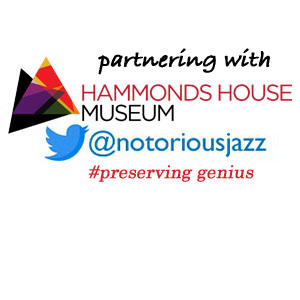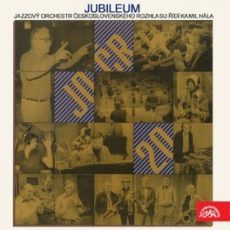
Daily Dose Of Jazz…
Kamil Hala was born on August 1, 1914 in Most, Czechoslovakia. During the late Fifties he led his own orchestra. He was a member of the Czechoslovak Radio Dance Orchestra beginning in 1960, starting as a pianist and later as its arranger and conductor. After the orchestra split in 1963 he was the conductor of the Czechoslovak Radio Jazz Orchestra until the 1990s.
Pianist composer, arranger, and conductor Kamil Hala passed away on October 29, 2014 in Prague, Czechoslovakia.
More Posts: arranger,bandleader,composer,conductor,history,instrumental,jazz,music,piano
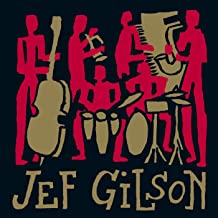
Daily Dose Of Jazz…
Jef Gilson was born on July 25, 1926 as Jean~François Quiévreux in Guebwiller, France. As a clarinetist he began playing with Claude Luter in the Boris Vian band. After that stint he switched to the piano. The experience of the Dizzy Gillespie Big Band led him to become an arranger and big band leader. In his band played, among others Bill Coleman, Bernard Vitet, Jean-Louis Chautemps, François Jeanneau, Michel Portal, Jean-Luc Ponty, Bernard Lubat, Lloyd Miller and Henri Texier.
For a time he was musical director of the vocal sextet Les Double Six. Gilson’s free jazz recordings did not materialize into success, and in 1968 he temporarily went to Madagascar. His 1971 return saw him concentrating first on ethno jazz, then total improvisation. In 1973 he founded his label Palm, and released recordings with his orchestra Europamerica, and with Butch Morris. For this more arranged record, which started reflecting his achievements of free jazz, he was awarded the 1978 Prix Boris Vian.
Up to his final days he lived withdrawn in Ardèche, France. Pianist, arranger, composer and big band leader Jef Gilson passed away on February 5, 2012.
More Posts: arranger,bandleader,composer,history,instrumental,jazz,music,piano
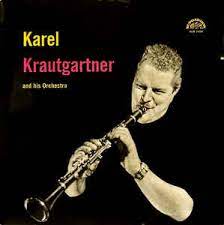
Daily Dose Of Jazz…
Karel Krautgartner was born on July 20, 1922 in Mikulov, Moravia into the family of a postmaster. He began studying clarinet on a private basis with Stanislav Krtička, and performed a demanding part of the Concertino by Leoš Janáček at the composer’s request at the festival of contemporary music in Frankfurt am Main, Germany in 1926. Acquiring the necessary skills of clarinet playing, and a fanatic passion for clarinet construction and components – reeds, mouthpieces, and barrels, which he later used his knowledge of wind instruments as a lecturer at German universities in Cologne and Düsseldorf.
In 1930 he began playing piano and by 1935 after moving to Brno, Czech Republic he became interested mainly in jazz radio broadcasts. 1936 saw Karel founding the student orchestra Quick band. In 1942, he signed his first professional contract as a saxophonist in the Gustav Brom orchestra in the hotel Passage in Brno. A year later he created Dixie Club and started to arrange in the Benny Goodman and Glenn Miller styles. From 1945 – 1955, the core of the Dixie Club moved to Prague and became a part of the Karel Vlach Orchestra.
He achieved a privileged position as the leader of the saxophone section and started to contribute with his own compositions. In 1956,along with Karel Velebný he put together the Karel Krautgartner Quintet, performed with the All Star Band, and with Studio 5. During the Sixties he became the head of the Dance Orchestra of Czechoslovakia Radio, renamed the Karel Krautgartner Orchestra. In 1968 he emigrated to Vienna, Austria and became the chief conductor of the 0RF Bigband. He eventually moved to Cologne, Germany. Clarinetist, saxophonist, arranger, composer, conductor and educator Karel Krautgartner passed away on September 20, 1982.
More Posts: arranger,clarinet,composer,conductor,educator,history,instrumental,jazz,music,saxophone
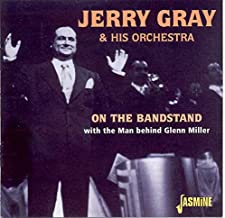
Daily Dose Of Jazz…
Jerry Gray was born Generoso Graziano on July 3, 1915 in East Boston, Massachusetts. His father was a music teacher who began teaching his son violin at age seven. As a teenager he studied with Emanuel Ondříček and was a soloist with the Boston Junior Symphony. By age eighteen he had formed a jazz band and was performing in Boston clubs.
1936 saw Gray joining the Artie Shaw orchestra as lead violinist and studied musical arrangement under Shaw. A year later he became a staff arranger. Over the next two years he penned some of the band’s most popular arrangements, including Carioca, Softly, As In A Morning Sunrise, Any Old Time, and Begin the Beguine. After the band broke up in 1939, Glenn Miller offered him a job arranging
In November 1939, Shaw suddenly broke up the band and moved to Mexico. On the next day, Glenn Miller called Gray and offered him a job arranging for his band. During his time with the Glenn Miller Orchestra, Jerry produced many of the most recognizable recordings of the era, arranging Elmer’s Tune, Moonlight Cocktail, Perfidia, and Chattanooga Choo-Choo among others, while his compositions among numerous others included Sun Valley Jump, The Man In The Moon, Caribbean Clipper, Pennsylvania 6-5000, and his most famous song, A String of Pearls. Many of his compositions became best-sellers.
The war years saw Jerry in Miller’s unit and became chief arranger for Miller’s “Band of the Training Command”, better known today as the Glenn Miller Army Air Forces Orchestra. He was the full orchestra’s assistant conductor, and conducted the orchestra’s first concert in Paris after Miller’s airplane disappeared over the English Channel.
After the war for a while he did radio and studio work around Los Angeles, California, including leading the band on a radio show called Club 15 that featured Dick Haymes. In 1949 he accepted a request from Decca Records to lead his own Miller-esque orchestra that was called Jerry Gray and the Band of Today.
Violinist, arranger, composer, and leader of swing big bands Jerry Gray, who continued to lead the Fairmont Hotel band into the 1970s, passed away of a heart attack on August 10, 1976 in Dallas, Texas. He was 61.
More Posts: arranger,composer,history,instrumental,jazz,music,violin
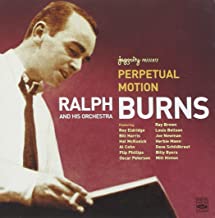
Daily Dose Of Jazz…
Ralph Jose P. Burns was born on June 29, 1922 in Newton, Massachusetts and began playing the piano as a child. Attending the New England Conservatory of Music, he learned the most about jazz by transcribing the works of Count Basie, Benny Goodman and Duke Ellington. While a student, he lived in the home of Frances Wayne, who was an established big band singer and her brother Nick Jerret was a bandleader who began working with him. He found himself in the company of performers as Nat King Cole and Art Tatum.
Moving to New York in the early 1940s, he met Charlie Barnet and the two men began working together. In 1944, he joined the Woody Herman band with members Neal Hefti, Bill Harris, Flip Phillips, Chubby Jackson and Dave Tough. Together, the group developed Herman’s sound. For 15 years, Burns wrote or arranged many of the band’s major hits including Bijou, Northwest Passage, Apple Honey, and on the longer work Lady McGowan’s Dream and the three-part Summer Sequence.
Herman band member Stan Getz was featured as a tenor saxophone soloist on Early Autumn, a hit for the band and the launching platform for Getz’s solo career. Burns also worked in a small band with soloists including Bill Harris and Charlie Ventura. The success of the Herman band provided Ralph the ability to record under his own name. He collaborated with Billy Strayhorn, Lee Konitz and Ben Webster to create both jazz and classical recordings.
Writing compositions for Tony Bennett and Johnny Mathis led to his later work with Aretha Franklin and Natalie Cole. He was responsible for the arrangement and introduction of a string orchestra on two of Ray Charles’s biggest hits, Come Rain or Come Shine and Georgia on My Mind. In the 1990s, Burns arranged music for Mel Tormé, John Pizzarelli, Michael Feinstein and Tony Bennett.
During the 1960s he quit touring as a band pianist and began arranging and orchestrating for Broadway shows including Chicago, Funny Girl, No, No, Nanette, and Sweet Charity. His first film score was for Woody Allen’s Bananas. He worked with Bob Fosse and won an Academy Award for Cabaret, and went on to compose the film scores for Lenny, New York, New York and All That Jazz, the latter garnered an Academy Award. Besides winning Oscars, Burns won an Emmy, a Tony and a Drama Desk Award. From 1996 until his death, he restored many orchestrations for New York City Center’s Encores! series.
Carefully hiding his homosexuality throughout his life, pianist, composer and arranger Ralph Burns, who was posthumously inducted into the New England Jazz Hall of Fame in 2004, passed away on November 21, 2001 from complications of a stroke and pneumonia in Los Angeles, California.
More Posts: arranger,composer,history,instrumental,jazz,music,piano




